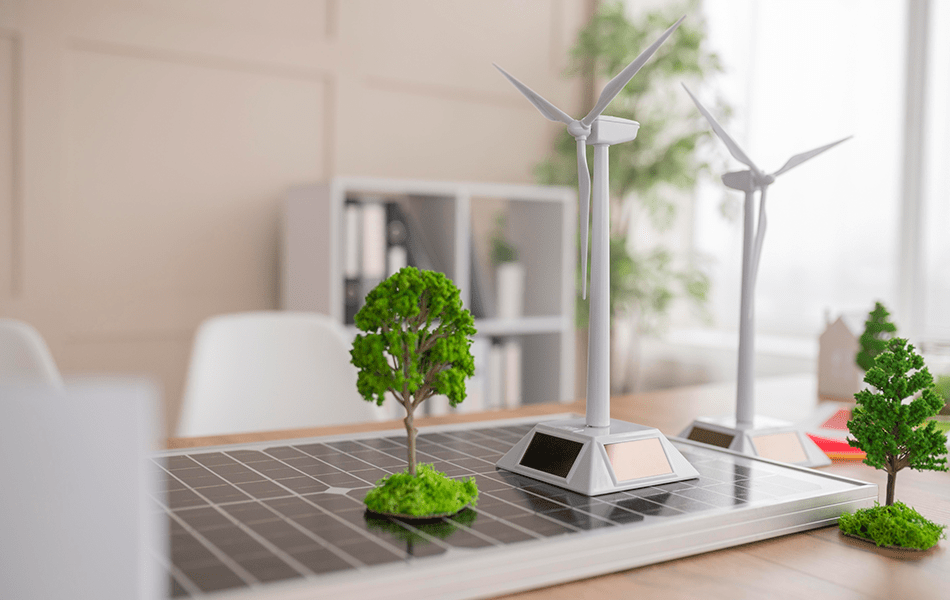Reduce your carbon footprint and help create a better world by renovating your house using eco-friendly and sustainable materials. There are too many trees and various eco-house design ideas you may take into consideration in the Philippines, where sustainability is becoming more and more significant. You might include the following natural light sustainable solutions in your home improvement project:
Energy-efficient lighting
Switch out standard incandescent light bulbs for LED ones that use less energy. LEDs use less energy, operate cooler, and last longer. To automatically turn off lights while not in use, think about adding motion sensor switches or timers to light fixtures.
Solar energy
To have cool roof and use the sun’s free, renewable energy, put solar panels on your roof. Your house may be powered by solar energy, decreasing your dependency on fossil fuels and your energy bills. The Philippines is a perfect site for solar energy and cool roof systems since it receives a lot of sunshine.
Water Efficient Fixtures
Install water-saving fixtures in instead of your outdated faucets, showerheads, and toilets. If you want to cut down on water usage without sacrificing performance, look for fixtures with a high Water Efficiency Rating (WER). To collect and reuse rainwater for non-potable uses like flushing toilets and watering plants, you might also think about installing rainwater harvesting systems.
Natural Ventilation and Insulation
Through include elements like large windows, skylights, and strategically positioned openings, you may look for eco-house design ideas for your house to enhance natural ventilation. Air conditioning units and artificial lighting may not be as necessary as a result. Additionally, adequately insulate your property to decrease heat transmission, which may aid in maintaining passive house at a pleasant temperature and lowering energy usage.
Sustainable construction Materials
For your restoration project, use only sustainable building materials and eco-friendly construction materials. Choose locally produced products to boost the regional economy and cut down on carbon emissions caused by transportation. Think about utilizing local materials: recycled glass for worktops, bamboo for flooring, and reclaimed wood for furnishings.
Rainwater Management
Implement appropriate rainfall management strategies to avoid flooding, eroding land, and water waste. Install permeable pavements, rain gardens, or bioswales to let rainfall percolate into the soil rather of flowing into storm drains.
Waste Management
Implement a waste management system as part of your home improvement plans. To keep garbage out of landfills, install recycling bins and composting stations. Opt for reusable or biodegradable alternatives and items with minimum packaging.
Green Roofing
Think about putting up a rooftop garden or green roof. Insulation, rainfall absorption, air pollution, and the urban heat island effect are all benefits of green roofs. They also provide a natural environment for insects and plants.
Efficient Appliances
Replace your outdated appliances with energy-efficient models. To cut back on power use, look for appliances with excellent energy efficiency ratings. Choose appliances with inverter technology, which consumes less energy than conventional versions, for your refrigerators, air conditioners, washing machines, and other appliances.
Community Initiatives
Engage in neighborhood efforts that support sustainable living. Join neighborhood or local groups that are concerned with environmental concerns. You can help build a more sustainable community by exchanging knowledge and resources.
Keep in mind that sustainability is an all-encompassing strategy that includes both little adjustments to our everyday routines and more significant actions, such as house improvements. You can create a more sustainable living space while lessening your influence on the environment by integrating these eco-friendly solutions into your kitchen renovation or home remodeling project in the Philippines.
9 Eco-Friendly Home Renovation Tips For Improvement Projects
1. Installation of solar power panels:
Installing solar panels at your house will help you use less traditional energy sources and lessen your carbon impact. They produce green energy, which lowers greenhouse gas emissions.
2. Insulation that is also more energy-efficient:
Increase your home’s insulation to further save money on electricity. Insulating walls new windows, attics, and floors can reduce the demand for heating and cooling while maintaining a pleasant interior temperature.
3. Low-flow fixtures:
To save water, install low-flow toilets, faucets, and showerheads other plumbing fixtures. These fixtures save this priceless resource by using less water without losing performance.
4. Window energy efficiency:
Install energy-efficient windows to your water heaters replace outdated, drafty ones. High-quality windows just like dual- paned window with effective insulation may keep the air filled your house cooler in the summer and minimize heat loss in the winter, lowering your demand for air conditioning and heating. Dual- paned windows provide both weather protection and soundproofing qualities. Air-filled, gas-filled, and silver-coated dual-pane windows are among the varieties available. Better thermal performance is achieved by each kind, keeping heat inside in the winter and outside in the summer.
5. Harvesting rainwater:
Install a rainwater collection system to collect rainwater for usage in your home for things like washing vehicles, watering plants, heating water, and flushing toilets. It can help you save a significant amount of money on your water costs and lessen the demand for municipal water.
6. Smart thermostats:
To keep energy loss and improve your home’s heating and cooling, use a programmable or smart thermostat. By allowing you to plan temperature changes based on your sun’s heat requirements, these gadgets help you save energy when you’re not at home.
7. LED lighting:
Use LED lights instead of conventional incandescent bulbs to keep energy star save electricity. LEDs use a lot less energy, are more durable, and generate less heat. They are an economical and environmentally beneficial kind heating system of illumination.
8. Eco-friendly flooring:
Think about laying down flooring made of eco-friendly materials like bamboo, cork, or salvaged and reclaimed wood throughout. Compared to conventional hardwood flooring, these solutions and new materials are renewable and have a less energy consumption and lesser negative impact on the environment.
9. Composting system:
Start composting your organic waste to keep it out of the trash and to produce soil that is rich in nutrients for your plants. Composting aids in completing the natural nutrient cycle and lowers methane emissions from landfills.
To secure the greatest outcomes for your eco-friendly, home renovation projects and other projects ever, keep in mind that it is crucial to evaluate your unique needs and seek professional advice when necessary.
Upgrade to an Eco-Friendly Fireplace
Consider about things like efficiency, emissions, and fuel source sustainability when selecting an eco-friendly fireplace. It’s also a good idea to speak with experts or fireplace specialists who can advise you on the finest solutions for your particular demands and financial situation.
Gas fireplaces use natural gas as a cleaner-burning fuel, making them a more environmentally friendly option than fireplaces that burn wood. Installing a wood pellet insert or changing it to a gas fireplace may retrofit an existing fireplace to increase efficiency and lessen its environmental effect.
Intelligent Planting for a Sustainable Homes
By using native plants, drought-tolerant plants, vertical gardening, companion planting, edible gardens and herbs, mulch, and bee-friendly plants, intelligent planting techniques may create a sustainable home environment.
Native plants are more resilient to pests and diseases, more suited to the local environment, and need less water. Succulents, cactus, and decorative grasses are examples of drought-tolerant plants that can survive with little irrigation, which lowers water usage.
In order to irrigate plants and lessen dependency on freshwater sources, rainwater harvesting devices can collect and store rainfall from rooftops. Vertical gardening methods make the most of available space and produce live fences or green walls.
Complementary plants are grown together in companion planting, which can lessen the need for chemical pesticides and encourage a healthy ecology. Herbs and food gardens can encourage a better lifestyle and lower carbon footprints.
Last but not least, bee-friendly plants draw bees and other pollinators, which improves the sustainability and health of the surrounding environment. Maintaining your home garden regularly, using the right irrigation methods, and using fertilizers and pesticides responsibly all help sustainable gardening practices.
Renovation materials for green living
To be sure the materials you choose for your renovations adhere to strict environmental requirements, seek for certifications and eco-labels like Energy Star, Green Seal, or Cradle to Cradle Certified. Consult with experts or environmentally conscious architects who can advise you on the best eco-friendly and sustainable materials for your restoration project.
Recycled Materials For Sustainable House Construction
Recycled materials may greatly decrease the need for new resources, minimize waste, and lessen the environmental effect of the building process. Remember that when employing recycled materials, it’s crucial to guarantee their quality, structural integrity, and conformance to building laws and requirements. For advice on the the ideal use of recycled materials for your particular project, speak with experts, architects, or builders with experience in sustainable construction
Why Smaller Houses Are More Efficient
Smaller homes in the Philippines provide several benefits for sustainable living.
They are more suited to the country’s hot environment since they are more affordable, energy-efficient, and require less time and work to construct.
Additionally, because of their smaller footprint, they use less energy and artificial lighting. Smaller homes also require less care due to having less space and fewer rooms, which lowers maintenance and upkeep expenditures.
Smaller homes encourage sustainable living since they utilize less resources during construction and less energy during continuing operations. This promotes a greener way of living, which is essential for combating climate change and cutting carbon emissions.
Smaller homes also have the advantage of being more affordable. Smaller houses are more affordable for a wider range of people and families thanks to cheaper building and maintenance expenses, as well as lower utility prices.
This meets the housing needs of low-income populations and encourages inclusive development. However, a person’s requirements, tastes, and lifestyle will determine how suitable and effective a smaller home is.
Install a Solar Tankless Water Heaters
In terms of energy efficiency and cost savings, installing a solar hot water system or tankless hot water heater can provide a number of advantages. Solar hot water systems utilise the energy of the sun to warm water for residential use, minimizing the need for fossil fuels and the environmental impact they have.
Homeowners can eventually return their original investment through decreased utility costs since they provide renewable energy, energy efficiency, and long-term cost savings.
On-demand or instantaneous hot water heaters, commonly referred to as tankless hot water heaters, heat water as it passes through the device, supplying hot water only when required. Due to their excellent energy efficiency, these heaters prevent the standby heat loss that storage tank heaters experience. They take up little room and may be mounted on the wall, conserving space in both small and big homes.
Households with high hot water usage won’t run out of hot water thanks to tankless heaters, which give an unending supply of hot water. Tankless hot water heaters often survive 20 years or longer with adequate maintenance, outlasting standard water heaters in general.
It’s critical to evaluate your unique demands, available space, and financial situation before considering the installation of a solar hot water system or tankless hot water heater. The best alternative for your house may be determined by speaking with a seasoned installation.
Why should you do a sustainable home renovation?
Reduced environmental impact, increased energy efficiency, cost savings, increased comfort and indoor air quality, increased property value, future-proofing against stricter environmental regulations, and a new life of personal satisfaction are just a few of the compelling reasons to give sustainable home renovations some thought.
These eco-friendly home renovation tips put an emphasis on environmentally friendly methods and supplies, lowering their carbon footprint and addressing climate change. Homeowners may reduce their carbon footprint and aid in the battle against climate change by utilizing energy-efficient appliances, renewable energy sources, and sustainable building materials.
Another convincing argument in favor of considering eco-friendly remodeling is energy efficiency. Homeowners may drastically cut their energy use, utility costs, and dependency on fossil fuels by improving their insulation, plugging air leaks, installing energy-efficient windows and doors, and employing smart home technology. Sustainable improvements are also less expensive to maintain, making them a more sensible choice.
Other important advantages of sustainable remodeling include comfort and health. In addition to improving thermal comfort and fostering a healthier living environment, sustainable homes with non-toxic construction materials and finishes lower hazardous substances and volatile organic compounds. Sustainable design elements and certifications, like LEED or ENERGY STAR rated, can raise a property’s value.
Another advantage of sustainable home renovations is future-proofing. Homes can adapt to changing standards and be ready for any energy efficiency rules in the future by integrating sustainable practices today. Another important advantage of a sustainable house makeover is increased personal pleasure. You may have a beneficial impact on the world and make your house more in line with your ideals by making it more comfortable, energy-efficient, and ecologically responsible.





